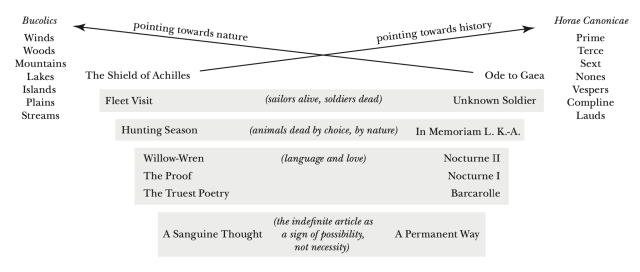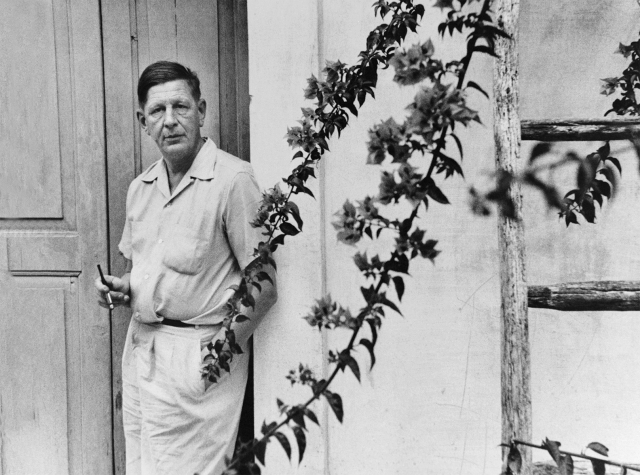If you look at the volumes published so far in the Auden Critical Editions series, you’ll see that, with the exception of the Juvenilia (a unique kind of text), they feature book-length works. I was very, very interested in the poems collected in Auden’s 1955 book The Shield of Achilles — I thought them his very finest poetic work — but I didn’t know if something as miscellaneous as a gathering of poems was a proper candidate for a critical edition. After all, every five years or so Auden put into a book the poems he had published since the previous book; wasn’t this just one more in that sequence?
Maybe. But the longer I looked at the poems the more I suspected that something was going on that transcended a mere gathering. I noticed, for instance, that Auden had divided the book into three major parts: the first, a sequence of seven linked poems (“Bucolics”); the second, fourteen poems not obviously related to one another; the third, another sequence of seven linked poems (“Horae Canonicae”). The next thing I noticed was something apparently trivial: that the two central poems in that middle section, at the very center of the book, are both quite short, and are the only poems in the collection that begin with the indefinite article: “A” – which is perhaps not significant, or even interesting, in itself. But it’s curious. If the two poems in the middle are somehow related to each other, and are balanced at the boundaries of the collection by paired sequences, that strongly suggests the rhetorical trope called chiasmus. The always-invaluable Princeton Dictionary of Poetry and Poetics defines chiasmus as
The repetition of a pair of sounds, words, phrases, or ideas in the reverse order, producing an abba structure, as in Satan’s attempt to rally the rebel angels: “The mind is its own place, and in itself / Can make a Heav’n of Hell, a Hell of Heav’n” (Paradise Lost 1.254-55).
And the more I looked, the more evidence for a chiasmic structure I found. I got excited … but also worried, because surely we all know, and from personal experience, the temptations of finding Hidden Meanings. “It all fits!” we cry, even though only some things actually fit and the rest we have to shoehorn into place. So I needed to be thorough, and I knew just the way to be thorough: I needed to make a chart.
Auden loved charts. His notebooks are full of them, and when, during the Second World War, he was teaching at Swarthmore College, he made an extraordinary chart of artistic/intellectual types for his students.
(If you struggle to read that, please know that Edward Mendelson – Auden’s literary executor, as well as the editor of his Complete Works and this Critical Editions series – made a more readable version of this chart for his book Later Auden.) As I started pairing off the poems in the series, the structure made more and more sense – as did my sense of how Auden understood what he was doing in his poetry at this point in his career.
But I couldn’t be sure about my discovery – or my “discovery.” So I made the best version I could of the chart and sent it to Edward Mendelson.

You may well imagine my gratification and relief when Edward replied: “This is staggeringly ingenious, and exactly the sort of thing that WHA could have done behind our backs, for his own pleasure.” And that’s precisely what I thought as well: That Auden’s orderliness of mind would have inspired him to plan his collection this way, while his playful secretiveness would have encouraged him to keep the plan to himself.
But what, readers may ask, is the substance of this secret plan? The chart itself gives you some idea, and I explain at considerable length in my Introduction to this edition of The Shield of Achilles, but I can put the point briefly by saying this: Auden was at this point in his life quite obsessed with the idea that humans, alone (as far as we know) among the world’s creatures, live simultaneously in nature and history. That is, we share with other animals a variety of bodily endowments and needs and a system of instinctual guidance, but also have (uniquely, Auden believed) the burden and the opportunity of making decisions and consciously experiencing the consequences of those decisions.
He put his view of these matters most concisely and elegantly in a poem he wrote just before beginning work on this collection. It’s called “Their Lonely Betters”:
As I listened from a beach-chair in the shade
To all the noises that my garden made,
It seemed to me only proper that words
Should be withheld from vegetables and birds.
A robin with no Christian name ran through
The Robin-Anthem which was all it knew,
And rustling flowers for some third party waited
To say which pairs, if any, should get mated.
Not one of them was capable of lying,
There was not one which knew that it was dying
Or could have with a rhythm or a rhyme
Assumed responsibility for time.
Let them leave language to their lonely betters
Who count some days and long for certain letters;
We, too, make noises when we laugh or weep,
Words are for those with promises to keep.
And, I might add, none of us keep all our promises, and many of us keep but a few.
The sequence called “Bucolics” deals primarily with how we live in nature, the one called “Horae Canonicae” primarily with how we live in history — but really, in describing human beings, we must always acknowledge the complex ways the two domains interrelate, how each constantly echoes the other, harmoniously or dissonantly.
I don’t know any poet who describes this peculiarity of the human condition more wisely and well, more piercingly and yet wittily, than Auden does; and I don’t know of any other poems of his that exceed the ones collected here in profundity and grace. It was a great honor and a great pleasure to edit this edition.
Alan Jacobs is Distinguished Professor of Humanities in the Honors Program at Baylor University. He is the author of many books, including How to Think: A Survival Guide for a World at Odds, and the editor of two other books by Auden, The Age of Anxiety: A Baroque Eclogue and For the Time Being: A Christmas Oratorio (both Princeton).

